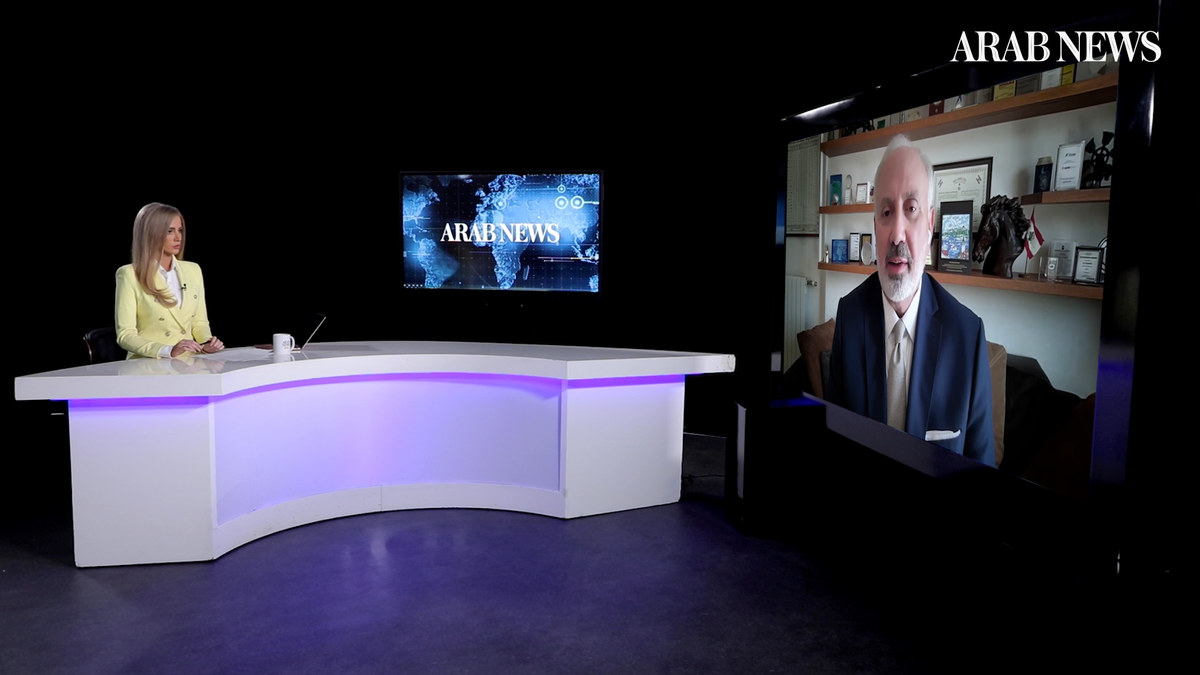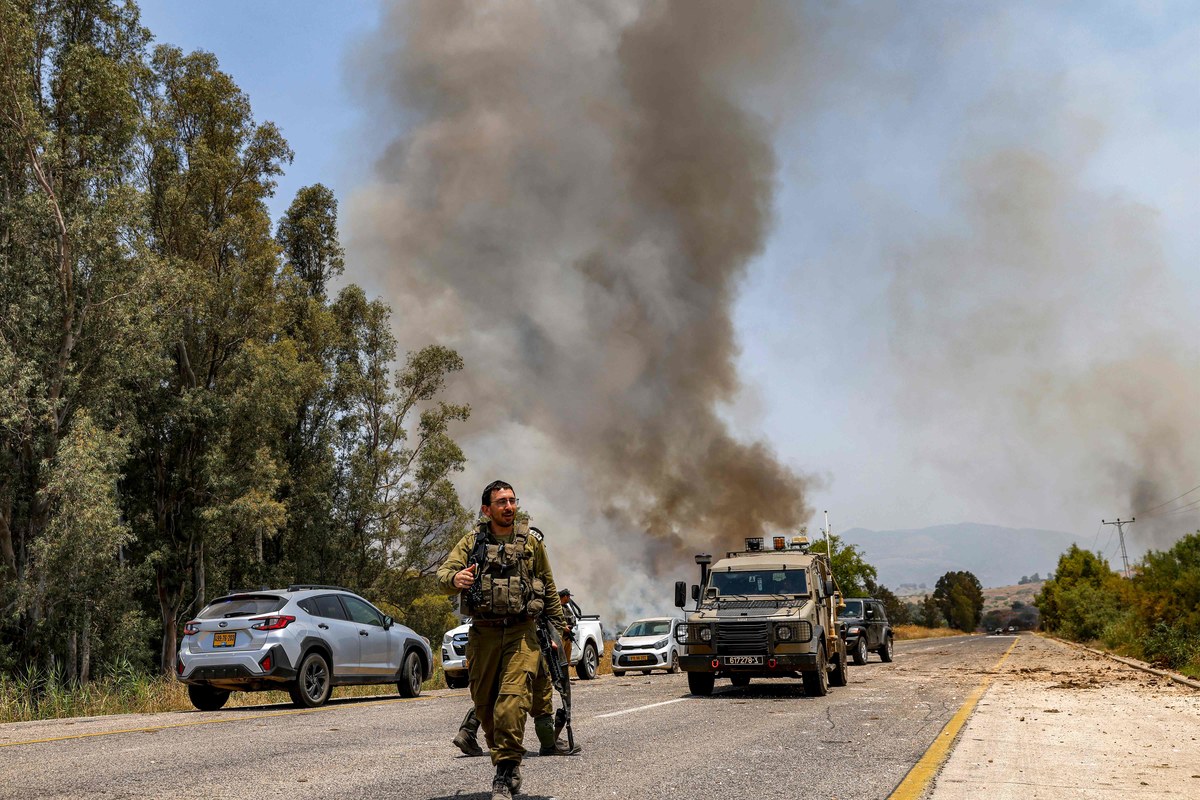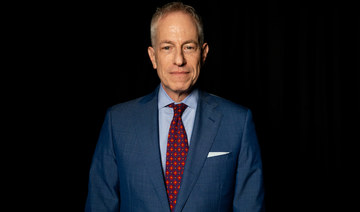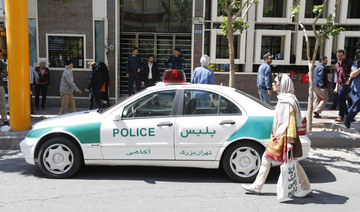DUBAI: People familiar with Lebanon’s sectarian politics and power camps are typically skeptical about the likelihood and success of a truly independent candidate for the presidency — a position that has been vacant since October 2022.
However, Ziad Hayek, who claims to be an independent, says that the current parliamentary climate makes it possible to stand successfully and work effectively as a president representing none of the main political camps.
“The makeup of parliament for the first time in Lebanon is such that it allows us to do that,” said Hayek during an appearance on the Arab News current affairs program “Frankly Speaking.”
“The two general factions that are defined by either pro-Hezbollah or against Hezbollah and pro-Western camp or pro-East, these two larger factions are almost equally divided in parliament. And neither side is able or has been able for the past year and a half to get their candidate elected.
“And so I think that they need to come to terms with that situation. They need to focus on finding a president, a candidate that they can both feel comfortable with, and yet does not belong to either side.”
Challenged by “Frankly Speaking” host Katie Jensen on whether he really stands a chance of success without aligning himself with Hezbollah, Hayek said only an independent could help the country to break with the past.
“The focus that I have today is on making sure that I’m an acceptable candidate to all sides, because all factions have to be comfortable, and I wouldn’t want to be the candidate of either side. That’s why I’m running as an independent candidate,” he said.
“At the end of the day, we are not going to move Lebanon from the mud … unless we really get to understand the issues that all the parties face and air concerns and allay their concerns. So that applies to Hezbollah and it applies to all the other parties.”

Independent presidential candidate Ziad Hayek outlined his political and economic vision for Lebanon during an appearance on the weekly Arab News current affairs program “Frankly Speaking.” (AN Photo)
Hezbollah has significant support among the Shiite population of Lebanon and even among many Maronite Christians, including presidential contender Gebran Bassil — the son-in-law of former President Michel Aoun, who took office thanks to his backing of Hezbollah.
Given the political clout of Hezbollah and Lebanon’s other big parties, can an independent hope to break through? Hayek says it is precisely because these big hitters have consistently failed to get their own candidates elected that an independent can break the deadlock.
“Of course, I do understand that Hezbollah has an influential role in this election,” he said. “I don’t discount that. But so do other parties. Hezbollah has not been able to get its candidate elected so far, and neither have the other parties.
“Yes, I do understand that people may think that my position is a bit unrealistic simply because Lebanon has not had this type of situation before. But I think it is in this situation that we have the opportunity to break away from the past and look to Lebanon’s future in a different way.”
Hayek is not new to Lebanese politics. In 2006, he joined the government of Prime Minister Fouad Siniora, becoming secretary general of the Republic of Lebanon’s High Council for Privatization and PPP until he was nominated to be president of the World Bank in 2019.
Having witnessed the devastating 2006 war, the financial crash of late 2019, the economic toll of the pandemic, the destruction of the Beirut port blast of Aug. 4, 2020, the government’s paralysis since October 2022, and now a low-intensity conflict on Lebanon’s southern border with Israel, one has to wonder: Why on earth would he want to be president?
“I want this job because I really feel that this place is one of the best countries in the world with so much potential,” he said. “And yet the political discourse in it has been going in the wrong direction. And I would like to change that.
“I’m hoping to be able to change the political dialogue, focus more on socio-economic matters, how to develop the country, how to develop its economy, rather than continuing the conversation that usually takes place about ‘this faction wants this guy’ and ‘this faction wants that guy.’
“None of these candidates have presented any program, any vision for the future. So I would like to change the way that the Lebanese public looks at politics in general, and focus on policies.”
Bridging the political divide in Lebanon’s multi-confessional system that emerged after the civil war would be a tall order for any experienced politician with a party machine to back them up.
Hayek is confident that his background in finance, helping governments balance their books and facilitate reform, makes him ideally suited to getting even the bitterest of rivals to work together for the public good.
“I have made a career of being able to work with people that everybody else said: ‘No, you cannot work with this guy. You cannot work with this group,’” he said.
“The Lebanese public in general is really yearning for somebody that can address the needs that it has and the daily needs of the Lebanese citizen, not just the geopolitics of America and Iran and all this conversation that really leads nowhere at the end of the day for the common person on the street.”

A smoke plume rises after rockets fired from south Lebanon landed near Kfar Szold in the Upper Galilee in northern Israel on June 14. Fallout from the Gaza war is regularly felt on the Israeli-Lebanon frontier, where deadly cross-border exchanges have escalated. (AFP)
Like it or not, Lebanon’s destiny is tied up in geopolitics. In fact, Hezbollah’s Iranian backers and their Israeli rivals have turned the country into a battlefield in their ongoing shadow war.
Since the Oct. 7 Hamas-led attack on southern Israel triggered the war in Gaza, Hezbollah has launched daily rocket and drone attacks against Israel’s northern territories to draw fire away from its Hamas allies.
Israel has retaliated with its own air and artillery strikes against southern Lebanon, leading to fears of an escalation that could drag the wider region into a major confrontation.
Asked whether a full-scale war can be averted, sparing Lebanon a devastating Israeli invasion it can ill afford to fight, Hayek said he was hopeful “cooler heads will eventually prevail.”
“Both the Israelis and the Lebanese, including Hezbollah, have to realize, all of us, that these wars lead nowhere,” he said. “It’s just destruction on both sides. And at the end of the day, this conflict has gone on for decades. And all these wars end with some compromise and some agreement on a ceasefire that lasts for a certain period of time.
“We need to move towards finding a lasting peace. And the makings of that were already starting to happen when Lebanon reached an agreement on the delineation of the maritime borders with Israel. There was work that was continuing, helped along by the Americans.
“Unfortunately, this Gaza situation came up and changed things. But I think when the dust settles, we do need to go back to working on the task of making sure that we build a lasting peace.
“For now, it is a terrible situation. There is no doubt about it. I think that cooler heads will eventually prevail as they always do in every conflict. And we will see some agreement between the parties.”
Nevertheless, the rhetoric from Israeli Prime Minister Benjamin Netanyahu and Hezbollah leader Hassan Nasrallah has continued to grow more hostile and the spate of cross-border attack more deadly, leaving some to conclude a full-scale war seems inevitable.
“Israel knows that it is in its best interest not to engage in a war in Lebanon that it cannot win,” said Hayek. “Lebanon is not Gaza. It’s going to be a lot more difficult. It’s something that Israel has experienced in the past, and I don’t think the Israelis wish to escalate the war in Lebanon.
“But continuing to play with fire, tit for tat and all of that, is not helpful because we are a hair trigger away from an escalation. I mean, any day there can be a strike that goes wrong beyond the normally accepted, currently accepted type of trading fire between the two parties.
“And such a situation can lead to a very fast escalation that may draw even regional powers into the equation. And I think that nobody wants that, really.”
Even if the region is spared a major war, Lebanon still has to contend with a broken economy, rampant corruption, shattered infrastructure, mass unemployment, extreme poverty, and a generation of young people who have fled abroad.
If he becomes president, how would Hayek go about untangling such a colossal mess?

Asked during his appearance on Frankly Speaking whether a full-scale war can be averted, sparing Lebanon a devastating Israeli invasion it can ill afford to fight, Hayek said he was hopeful “cooler heads will eventually prevail.” (AN Photo)
“I have presented a plan specifically for Lebanon to get out of its financial crisis,” he said. “It is built on converting the bank deposits into tradeable CDs (certificates of deposit) on the Beirut Stock Exchange to enable the capital markets to come back to life again.
“It involves using some of the gold reserves to create funds for social development and for economic development. It includes regaining the ability of the government not to raise taxes but to collect taxes in order to pay for the services it needs to deliver to the Lebanese public. So I do have some ideas.
“I think that the International Monetary Fund’s approval is very important because we do need the seal of approval of the IMF to regain the confidence of investors. But I think there are many ways to discuss with the IMF what could be acceptable to them as well as taking the Lebanese reality into consideration.”
Hayek also wants to see Lebanon revive its economic ties with the Gulf Cooperation Council bloc, allowing Lebanese companies to prosper from investment opportunities, in particular Saudi Arabia’s Vision 2030 agenda.
“The relationship with the GCC is crucial,” he said. “Those countries are the hosts of hundreds of thousands, or tens of thousands of Lebanese that are working there. So they are very important currently to our economy with the remittances of these people.
“But also, of course, the Lebanese are contributing to the growth and development that is happening in the region because the Lebanese working there are highly educated, highly skilled, able to contribute in a big way.
“This mutual relationship of benefits needs to be strengthened. I think that with Vision 2030 in Saudi Arabia and other plans in the UAE and other countries, these are big opportunities for the Lebanese, big opportunities for Lebanon to solidify its relationships with those countries and governments and projects and as well as for them to see that they already know that Lebanon has much to offer to contribute towards their success.”





























